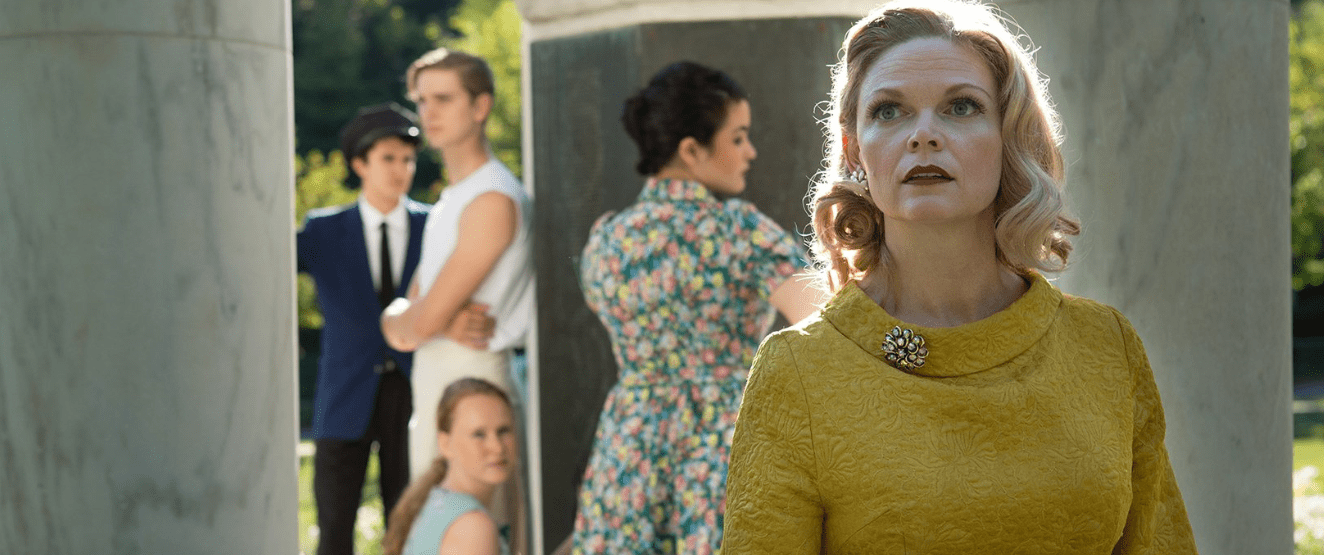SALT LAKE CITY — It’s not often that we get to see Greek theatre here in Utah, so Westminster College’s annual Classical Greek Theatre Festival is always treat. I’ve had the privilege to review at the festival just once before and as such, I went into this year’s production, Euripides‘s Ion with high hopes. I was not disappointed.

Euripides wrote Ion toward the end of his life, around 414–410 BC. This play centers on a mix of characters who, unbeknownst to themselves, are all intertwined. Before the action of the play begins, Hermes gives a monologue of exposition. He explains that many years before, the god Apollo essentially raped and consequently impregnated the Athenian Princess Creusa. Ashamed and commanded by Apollo to silence, Creusa delivers the baby and leaves him to die where Apollo raped her. Apollo intervenes, making Hermes save the baby and leave him outside Apollo’s temple to be raised by the priestess Pythia. Fast forward about eighteen years, and the audience meets Ion, a young man who is a servant at Apollo’s temple. Through a series of events (evidently orchestrated by the gods), Ion eventually finds the family he has always longed for, though there is heartbreak and turmoil along the way.

Obviously, this show deals with serious issues. Rape, the immorality of the gods (especially Apollo), family, virtue, women’s roles, and finding joy through pain are just some of the themes the play explores. Yet despite its thematic heaviness, Ion is a rare Greek tragedy that actually ends on an upbeat note.
Going to see a ancient Greek play may sound like poking yourself in the eye if you’ve never gone before. But happily, with a modern American English translation by David Lan and the clear direction of Alexandra Harbold, the play engaged and entertained. As I expected, there were long monologues and mythological allusions. Harbold brought these potentially dull parts to life by utilizing her non-speaking actors to act out the words. For example, as Ion (played by Brandt Garber) mocks and tries to scare off various birds from polluting the temple, actors actually played the birds—each taking on characteristics suggestive of their bird type. They carried books and feathers, flapping the books like wings and dropping feathers as they preened. By using the actors rather than forcing the audience to imagine the birds, Harbold successfully made what could have been a tedious monologue into a delightful scene.
A unique decision by Harbold and costume designer Shannon McCullock to mid-twentieth century costumes worked. Queen Creusa, dressed in a mustard skirt suit adorned with a classy brooch, white gloves, and tasteful jewelry, mirrored America’s queen of the early 1960’s, Jackie Kennedy. Creusa’s husband, King Xuthus, complemented her in a sharp business suit and tie. The chorus members each wore different period styles, from the teenager look of a young woman wearing a floral summer dress with a cardigan and sneakers, to a more daring and modern pantsuit (by 1950’s standards) worn by another chorus woman.

The original background music by sound designer and composer Jen Jackson enhanced this production’s uniqueness. Jackson’s orchestral music complemented the piece and built tension in appropriate moments. Also, following the Greek classical style of incorporating singing into the play, several portions of dialogue became solos and group numbers by setting the text to Jackson’s music. Overall, the musical style reminded me of religious chanting, which seems consistent with what a classical Greek chorus would have sounded like.
The acting in Ion was nothing short of extraordinary. Of particular note was Tamari Dunbar as the emotional epicenter of the play, the embittered Creusa. The role of Creusa is a roller coaster of emotions, from traumatized to angered to hopeful to despairing. Dunbar masterfully and believably portrayed this Greek heroine’s levels. Another standout performance was Aaron Adams as Xuthus. Adams brought energy, excitement, and sincerity to Xuthus, and the relationship between Creusa and Xuthus as husband and wife felt genuine and tender. Adams also excelled at comedic timing and bringing the laughs, particularly in a scene in which he and Brandt Garber’s Ion play off each other perfectly in a cat-and-mouse exchange. Instead of hunting Ion, however, Xuthus simply yearns to embrace him, but Ion is understandably confused and resistant. The way the two actors interact and the fight choreography by Adriana Lemke made the scene stand out as one of the night’s funniest.
As Ion is the play’s title character, I would be amiss to not mention the innocent, youthful, hopeful, and passionate Ion that Brandt Garber brings to life. He is from the start a very likeable protagonist, one who easily gains the audience’s support. Add to that Garber’s physique and charm and he even looks the part of a demigod.
Westminster College has succeeded again in making classical Greek theatre palatable and even entertaining for a modern audience. I highly recommend attending this production of Ion. Although rarely produced (given the difficult subject matters), this production’s great concept, Harbold’s steady hand, and consistently phenomenal performances make the Ion worth seeking out.
[box]The Classical Greek Theatre Festival production of Ion plays at the Courage Theatre on the campus of Westminster College on September 14–16 at 7:30 PM before touring locations in Salt Lake, Utah, and Weber Counties. Tickets at the Westminster College performances are $9–18. For tour locations and more information, visit www.westminstercollege.edu/greek_theatre.[/box]
